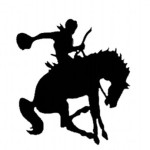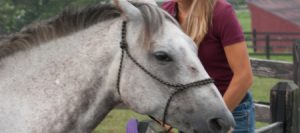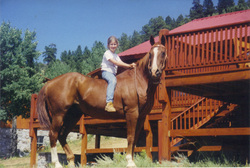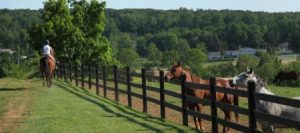We have all been caught off guard by an out of the blue spook, or sudden exuberant buck. But are there warning signs for this type of behavior? While even the best riders can still be suprised by a spook or buck, there are usually signs that a horse is tense or unhappy and these emotions usually proceed bad behavior. In this video, I talk about how you can tell if your horse may be getting ready to act up, and point out a few tell tale signs of tension.
Watch the video, then leave a comment and share your story of a time you could tell something was “brewing” with your horse. Or you can also tell us about a time you missed the warnings, any hindsight wisdom?
I didn’t mention this in the video, so I wanted to remind you that just because you see or feel these warning signs doesn’t mean that a spook or buck is inevitable, it just means that your horse is tense and possibly unhappy about something, so be alert. It is always important to know your horse and your riding skills, and be honest with yourself on what you are comfortable working through and when it is best to just get off or try something else. Listen to your horse, stay focused, and stay safe!
See you in the comments,
Callie














22 Responses
Hi Callie, Another great video. Happy New Year to you!!
I have had my fair share of dealing with spooks and I have to say that having a proper seat in the saddle and by that I mean a secure seat with hands on the reins, is the only way to deal with spooks effectively. I dread the thought of my horse having that reaction, but I have found on more than one occasion that if I do concentrate on my position when riding, when spooks happen, I react instinctively and pull my one rein to the side and get their attention directed to me immediately and with my secure position in the saddle I find that I automatically sit deeper and sit back and this all happens in milaseconds.
Afterwards I always say to myself that I handled that well and so why do I dread the thought of them happening? I can do this. But I also know that it is the level of the spook and not ever one is the same.
I also find that if I see my horse’s attention directed away from me and he is acting like he might spook, I will talk to him or make small sounds to get his attention and push him forward while watching his ears. As soon as his ears get stiff, as you had mentioned in the video, I talk, whisper, cluck, hiss, whatever it takes to get his attention on me again. I don’t like to ignore what he may be afraid of as I want him to deal with it, so we will pass by an object of fear several times until he starts to relax somewhat and realizes that the object will not jump out and attack him. When I can do this, I will usually stop my horse at the offensive and scary object, for a rest. If he is particularly upset, I will dismount and walk him to the object and perhaps give him a treat while he stands near the scary object and invite him to explore and sniff it. It all depends on the level of his fear that will dictate how I handle it.
I am looking forward to more video’s and courses this year.
Hi Teresa, Great tip on both position and using your voice to get your horse’s attention back!
Those are awesome tips! Some of which I’ve done myself. I have an Arab Appy mare who, is unpredictable most of the time, but I’m beginning to “feel” her better. So when we come up to maybe a tree that is charred (her most unfavorite), or a snowy patch of ground, I will get off and lead her to it, talking gently to her all the while. When she’s touched it, sniffed it, and maybe chewed up some weeds, we’ll mosey along. I could probably do the treat thing with my quarterhorse Pal. He’s not as easy going as she is when he spooks at stuff. After I get off, he’ll grow about 10 stories and circle me, sometimes bucking. Not fun… Great helps!
Thanks so much for all of the excellent information! I found a way to help my TB Joe relax wherever we happen to be: figure eights! It gives us both something to focus on and right away Joe will lower his head , take a deep breath, and tune back in with me. On the trail, I pick two trees to go around. So far it has worked every time! Figure eights have become a calming routine for us both.
Hi Nancy,
I use figure eights too! Thanks for sharing your tip!
Hi Callie:
Thanks for such informative training tips and keep up the great work.
We had a mare recently who was bucking more than usual. She’s in top condition, very smart and willing, and in training for endurance. However, she started chewing the barn (never before), displaying sensitvity to her girth, and the bucking caused concern. Called Vet immediately and he diagnosed an ulcer. This is common in show and endurance horses, and starting her on “smart gut” + medication with rest. She’s showing quick improvement daily and will be back on the trails soon.
Thanks again,
Nance
Hi Nance, Thanks for the personal story! A good reminder to always rule out physical issues!
I ride a green horse who sometimes bucks at the canter. I think the more bucks you ride the more you will be able to see them coming. It is a great feeling when you can stay one step ahead of your horse and prevent a buck. =)
Thank for all your wonderful videos,
Cait
It is true – you get used to the feeling of when they are just starting to hunch their back and get ready to let loose!
How do you stop a buck? One reign stoppy? I’ve never been able to feel it coming on my mare. My gelding has never bucked with me on him. Don’t want that happening.
I am new to horses and to riding. At 57, I think I hurt more when I hit the ground! I rode my newly acquired 12 year old Quarter Horse from my yard to a field. We were out there walking near the brush on the outer edge when I felt him change underneath me but wasn’t sure what it was or what to do. He shifted his body and bucked sending me in the air as he ran off. I hit the ground flat on my back and watched from there as he bolted to a fenced pasture where four other horses were and he stopped in front of the electric fence where he was met by a stallion. I walked over to him, took his reins and walked him slowly back to my yard where I got back on him and rode there for about twenty minutes. Needless to say, I’m more nervous now. That was not something I ever want to repeat but I know there will always be the potential! Thank you for your advice!
Something similar just happened to me yesterday. My horse is basically a bomb-proof husband-horse but she had her teeth done 3 days prior and I’m guessing she was still feeling weird from the anesthesia – because she tripped a bit early on in our ride and I managed to hang on, but later she tripped hard coming down a bit of a hill and as she tried to recover, swinging to the side, I came off HARD, landing on my back and snapping my head back (he met on and in the sand luckily!!). Also 57, I’m surprised I’m not hurt more than I am!! My neck is wrenched but otherwise I’ll survive. I should have known better and given her a week (or more!) off. Vet dentists should tell/remind/warn people that anesthesia effects can linger!
Hi Edward, did you talk about this incident with your vet? Usually, by several hours afterward they should be fully recovered so there might be another reason for the tripping to explore it a little further!
-Julia Burdy, CRK Training Community Manager
very interesting Callie. i did not know some but i did know that if they titin up they may spook are bolt and all but that is a good sign the ears and lips i pay attention to the ears and ears and eyes alot but not even thinking about the lip thank you
Hi Callie
I have a horse that is 12 years old, but wasn’t riden for 3 years. She has bucked me off twice now. My question is should I be riding her or just working on the ground? I really don’t want to give her up. I am an older rider and have been riding for 3 years now.
Thanks
Catherine
Hi Catherine,
Don’t give up! It is difficult to say why the bucking is happening, as it can have many different causes. Here is another video to help with that: https://crktrainingblog.com/horse-training/why-is-my-horse-bucking-2/
I would go back to groundwork until you feel you have an idea on the cause of the bucking and can begin working through it with some unmounted exercises.
Hi Callie just had this expeince last thursday. I knew he wasnpt happy just by looking at him. his head high ears high not moving willing probably a littler stiff, this is the 2nd time latley don;t know if its the cold or maybe his saddle is pinching. was thinking of asking my trainer to not retighten in the lesson. also did feel the back go up before the buck and he took off. was told he may have heard something but i think it had to do with the lesson or and me. i tried to pulls the reins up so his head would not go down to a full buck because then he doesn’t stop, my trainer yelled to pull up my arm more i was too low and his head could have gone down. instead he just ran back to the door he didn’t want to ride. not sure what do do now. should i just get off if he is in that kind of mood or does it teach him to misbehave so he gets out of work?
Hi Corinne, this is tough to answer here because it really could be either – behavioral or something physical that is bothering him. I wouldn’t recommend getting off immediatly after an unwanted behavior incident or this could reinforce that behavior. However if you are preparing for or starting into a ride and notice this mood, it may be worth taking a closer look at the saddle, palpating his back and sides to look for soreness, etc
Hi Callie: I was injured during a horse trail ride while vacationing in Tennessee. I have ridden horses on trail rides before with no incident so I didn’t anticipate anything happening. My daughter loves horses and I wanted to surprise her on our Mother/Daughter trip with a trail ride. It was a 1-hour ride on a rocky terrain going up and down hills in the back woods – different than any other ride I have been on before. During the entire ride the horse kept bringing me towards trees as he seemed to want to rub his head. I asked the guide why he kept doing that and he said to me -“he is just itchy today – just redirect him away.” Just before the end of the ride we had stopped and again the horse walked to a tree. This time the guide said to let him scratch as the ride was also over. When I did he walked to a broken tree trunk with a jagged top and rubbed his head really hard – so much that he first pinned my leg between his body and the tree – I tried to push off the tree to free my leg because I felt it being crushed – but then the horse’s head got stuck to the tree because his mane got tangled into the top of the jagged tree – at that point the horse panicked and when he pulled away from the tree it ripped out a large part of his mane causing him to rear back on his hind legs throwing me off – but my foot was caught in the stirrup so he dragged me about 15 ft until I luckily came loose and dropped. Needless to say I couldn’t move and I was taken away in an ambulance to the hospital. When I finally made it home I spoke to someone who rides to ask if it means anything when a horse exhibits that behavior of pulling to trees and they told me that that is a sign they want you off and does not want to be ridden – so get off slowly. Is this true and if so, would an experienced person recognize this type of behavior? Any information would be helpful to understand. Thank you.
Vinnisa – that sounds like it was a scary experience, I hope you didn’t sustain any injuries. Many times when horses start sweating, which I’m guessing he might have been sweating from navigating the rougher terrain, they definitely can get itchy! However I wouldn’t say that he did any of that to try and get you off of him necessarily, more like the scratching felt good and he wanted to do more of it! He probably felt trapped when his mane was caught and that is why he had that type of reaction. Should you run into the situation again during another ride I would not let them scratch on the trees – maybe just give them a good scratch at the end of the ride as a ‘thank you’
– Julia Burdy, CRK Training Community Manager
Love your videos and articles. I have been a rider all of my life. I have owned at least 20 horses, broken 3 start to finish and have never had a bucker until now. We are having quite a time with our riding.
So happy to hear you enjoy our videos Mary! Glad to have you as a part of our community
-Julia, CRK Training Community Manager